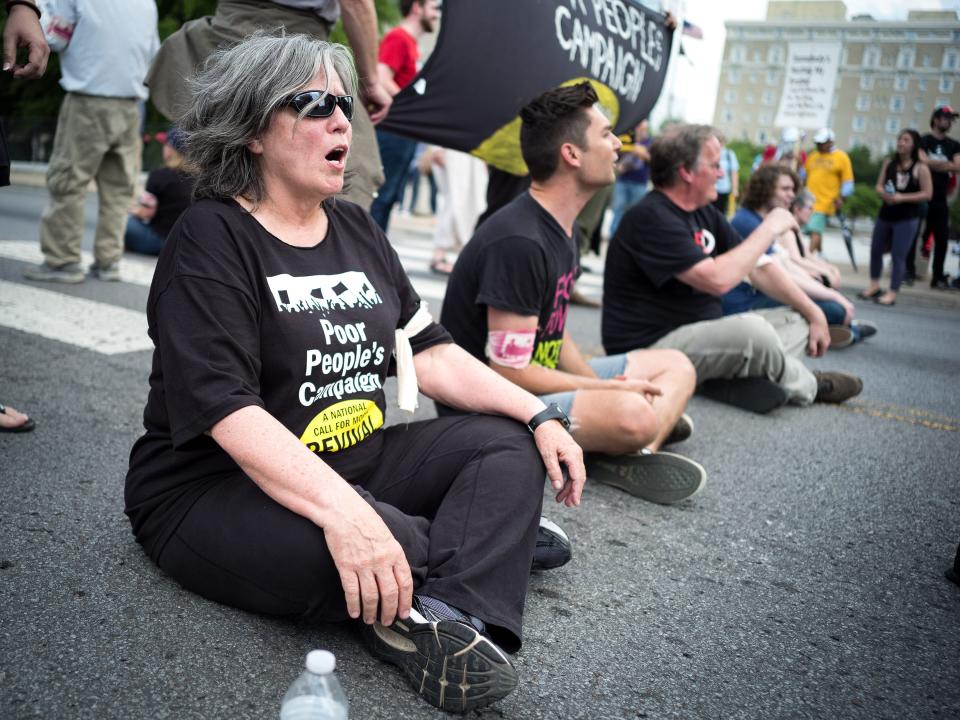Wedge issues continued to divide Americans during election, but poverty shouldn't be one
Close races in swing states and President Donald Trump’s lies about voter fraud have created widespread anxiety and a general acceptance that America is more divided than ever. But polarization is a political tactic that has long been deployed by people who do not want change in America’s political and economic system.
Yes, division is real. But Americans are incredibly united in an understanding that our system is not working for most of us. Despite deep political divisions, fighting poverty is a struggle that unites most Americans.
As billionaires have watched their wealth grow exponentially during the coronavirus pandemic, most Americans have struggled to make ends meet while caring for children at home, finding PPE to keep themselves safe and wondering why their government cannot pass a relief bill. Some of the benefits in the initial COVID relief bill helped the wealthiest Americans. Though people did receive one-time checks from the government, that money was spent long before tens of millions of Americans were able to get back to work.
This year's economic crisis has served to highlight the extreme inequality that the Poor People’s Campaign: A National Call for Moral Revival has sought to address since our launch in 2018. Before we organized coordinating committees in 43 states, we worked with some of the best economists to understand why, in the wealthiest nation in the world, there was not a single county in the country where someone working full-time and earning minimum wage could afford to rent a two-bedroom apartment.

When we looked closely at the economic reality for everyday Americans, we found that 140 million people were either poor or low income, just one emergency away from not being able to make it.
The coronavirus pandemic has not impacted all Americans equally. According to an analysis by the Centers for Disease Control and Prevention, poor people are three times as likely to contract COVID-19. And when they do, they and their families are not able to quarantine and skip work. Poverty has not only made the pandemic worse for poor people; it has fueled our public health crisis as many service workers have continued to show up for work, even when they suspect they may be infected with the virus, because they have no other way to survive.
In the face of this painful reality, Americans increasingly support policies that address poverty. Support has increased especially among Republicans, who have historically been less supportive of such proposals. Take living wages, for example. More than 70% of Americans support raising the minimum wage, according to an Ipsos poll. Before the pandemic, only 48% of Republicans backed this anti-poverty measure. But in late August, 62% of Republicans said they supported raising the minimum wage.
Universal access to health care is another anti-poverty measure that a growing majority of Americans support. Despite the Trump administration’s attacks on the Affordable Care Act, its expansion of health care to 25 million Americans continues to remain popular. Ahead of this year’s election, 63% of Americans said that the government has a responsibility to make sure everyone has access to health care — a four percentage point increase since last year. When asked if the government has a responsibility to provide health care for the poor and the elderly, even a majority of Republicans agree.
No doubt, this year’s election has highlighted deep divisions in our common life, many of which are regularly exploited by the wealthy few.
But this is not new. The long story of inequality in America is that race, politics and cultural wedge issues have been deployed consistently to divide and conquer coalitions of Native, Black, white, brown and Asian Americans who have pushed this nation to guarantee equal treatment under the law and an economy that works for everyone.
Those wounds don’t go away when we commit to tackle poverty, but there is promise that they can heal when we recognize that some things are not about left or right, but about right vs wrong. It’s wrong that nearly half of citizens of the richest nation in the world struggle to make ends meet.
Ending poverty is a moral issue that can and must unite us all.
Rev. William Barber is president of Repairers of the Breach and co-char of the Poor People's Campaign. Follow him @RevDrBarber.
This article originally appeared on USA TODAY: Wedge issues divided America during election. Ending poverty should unite us

